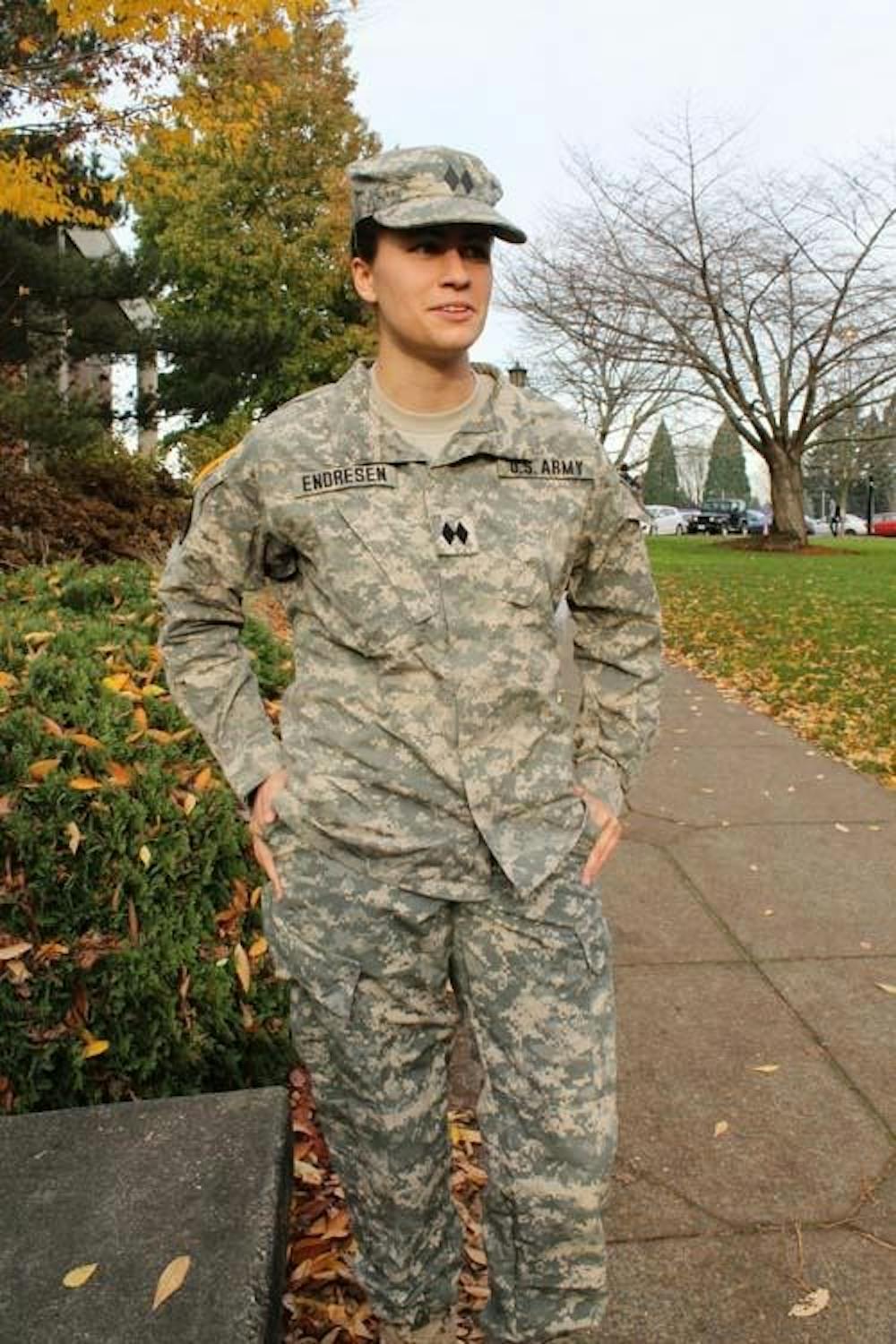ROTC members have different opinions on the Pentagon’s decision to open 14,000 combat positions to female soliders
Senior Katie Endresen hopes that, because of the ban lift, some ROTC programs will be more open to women. Endresen plans to go into active duty following graduation in May. (Giovanna Solano | The Beacon)
By Nastacia Voisin, Staff Writer voisin15@up.edu
As a little girl, senior ROTC cadet Brie Taylor, imagined a future where she might be part of an all-female special operations unit.
"I've wanted to go into combat since the day I signed on," Taylor said.
Now the chance for Taylor to lead an infantry unit is here.
On Jan. 24, U.S. Defense Secretary Leon Panetta announced that the 1994 rule prohibiting women from combat was overturned - opening more than 14,000 front line positions for women in the army.
The lifting of the 20-year ban is causing a stir within UP's ROTC program. Supporters of the ban lift say it will give women the chance to advance their career and get rid of some of the sexist culture within the military. Others are concerned that integrating women in combat units will change the strength and cohesion of the military.
Taylor has been waiting for the ban to be lifted ever since "Don't ask, don't tell" was repealed in 2010.
"This is groundbreaking," Taylor said. "It's a recognition that we can do what guys can do. Women can now be a real part of the military. Full-fledged. No limits. Taking the same risks and earning the same rewards as men."
"We're all for the Army"
Maj. Gary Repp, assistant professor of military science and operations officer, said the ban lift won't change the structure of ROTC training, which has always treated males and females alike, but individual ROTC cadets are still adjusting to the idea of women being allowed in combat.
Brennan Bredl, senior ROTC member, thinks the conflicting viewpoints won't damage ROTC unity.
"We're all on the same page in the sense that we're all for the army," said Bredl. "We'll do what we're told, because that order comes from the top, but that doesn't mean that we don't have our own opinions."
Cadet Daniel Stover, a senior, said that some ROTC members aren't enthusiastic about women in combat roles but are getting used to it.
"I think some people may not be entirely comfortable with the idea of females in combat," said Stover. "At the same time, now that it's actually happened, people are having to adjust."
According to Stover, the Army is still a male-dominated realm, and equalizing the playing field between men and women could cause problems. Stover said mixing the sexes could be problematic if men are unwilling to take orders from women and if the physical standards for the Army have to be adjusted.
"I honestly feel OK with it. And I think that a lot of my peers are warming up to the idea," Stover said. "But that kind of change doesn't happen overnight."
Taylor thinks standards won't change and that gender equality in the Army is a long ways off.
"I hope that they don't lower the standards. I want it to be equal, not fair." said Taylor. "They're always going to see it as females catching up to males. They never have to catch up to us. I've never heard a guy say, 'She's better than me.'"
More opportunities for women
While ROTC training won't be affected, senior ROTC cadet Katie Endresen is looking forward to changes.
The ban lift might affect the Cadet Troop Leader Training Program (CTLP), an internship program that allows ROTC cadets to shadow a platoon in the army. Endresen said that in her junior year one CTLP position was gender neutral, while nine were with infantry units and exclusively for males.
"It would be interesting to see a female shadow a traditionally male unit," said Endresen.
Endresen is planning to go into active duty after graduation. She said allowing women in combat roles is encouraging for gender equality across the board.
"It goes beyond just the Army," said Endresen. "It's comforting to know that this change is now here. That there is one less rule that says, 'Hey, girls can't do this.'"
Endresen thinks it will take time for criticism of the ban lift to fade, but that the future is promising for her and female cadets.
"When they started desegregating units between African Americans and whites, they had similar arguments about unity, and look where we are now," said Endresen. "Honestly if the worst thing someone can say about me as a solider is that I am woman, I can live with that, because I hope that myself and all soldiers are judged by their ability to do their duty, not by their gender, sexual orientation or race."
Senior Brie Taylor has wanted to go into combat since she first joined the Army. Taylor is excited that women now have fewer limits on their military careers. (Giovanna Solano | The Beacon)








